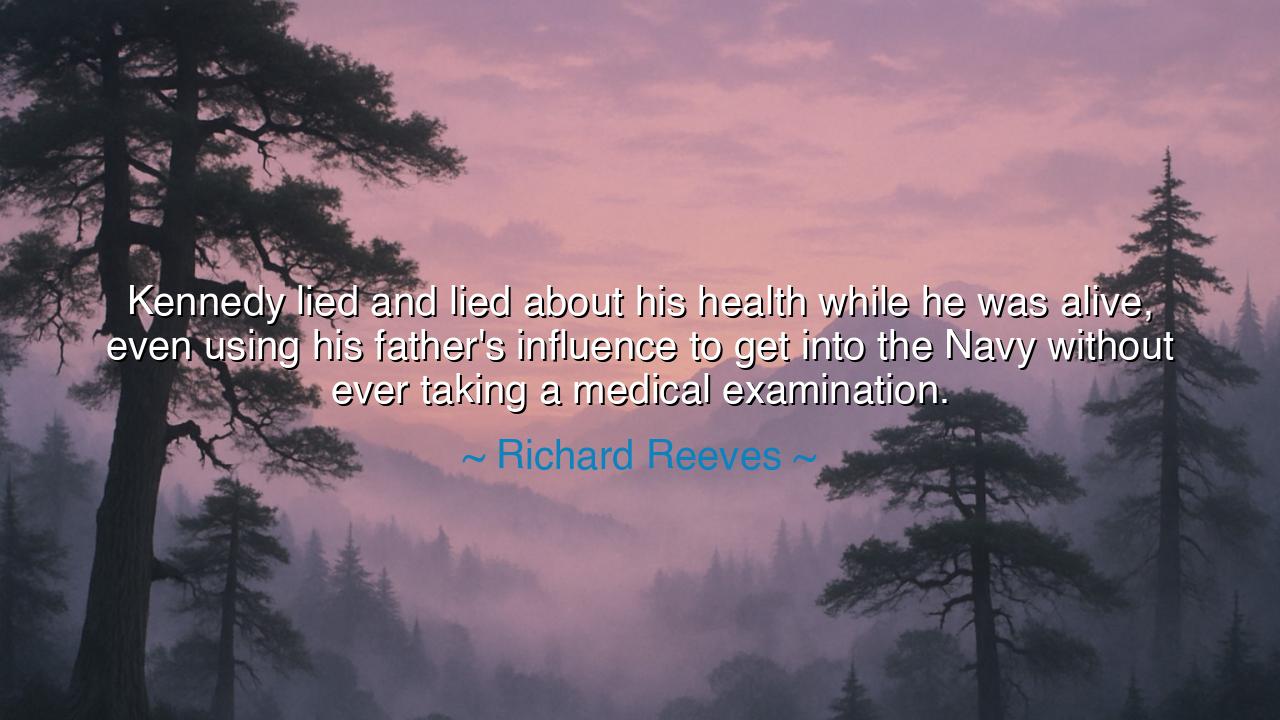
Kennedy lied and lied about his health while he was alive, even
Kennedy lied and lied about his health while he was alive, even using his father's influence to get into the Navy without ever taking a medical examination.






Hearken to the words of Richard Reeves, whose reflection casts a critical eye upon the human frailty that can accompany power and privilege. He declares, “Kennedy lied and lied about his health while he was alive, even using his father's influence to get into the Navy without ever taking a medical examination.” In these words lies a timeless lesson: the allure of influence and ambition can tempt even the most public figures into deception, and the concealment of truth carries consequences both moral and societal.
Since antiquity, sages and historians have observed that power often magnifies both virtue and vice. In Rome, the actions of emperors like Tiberius and Nero reveal how privilege and authority can distort judgment, leading individuals to manipulate circumstances for personal gain. Reeves’ reflection resonates with this ancient understanding: the manipulation of institutions and truth to serve ambition undermines integrity and sows mistrust, even when cloaked in prestige or familial influence.
Consider the story of Alexander Hamilton, who navigated the corridors of influence and power with both brilliance and caution. Though he was careful with his reputation, history remembers that even minor deceptions or strategic omissions can leave enduring stains. Kennedy’s concealment of his health, Reeves argues, represents a breach of trust analogous to these historical examples, demonstrating that the integrity of leadership is inseparable from transparency and honesty.
Reeves emphasizes that privilege—here, the influence of a powerful father—can enable evasion of accountability. In the annals of history, wealth and position have often allowed individuals to circumvent standards imposed upon others, from medieval nobility avoiding military duty to aristocrats securing offices for which they were unqualified. Kennedy’s use of his father’s influence to enter the Navy without ever taking a medical examination exemplifies the ethical hazards inherent in unearned advantage and the temptation to prioritize personal ambition over responsibility.
The moral lesson is both enduring and urgent: honesty and accountability are the foundations of public trust. Leaders who conceal weaknesses or manipulate circumstances, regardless of intention, undermine not only their own credibility but the institutions they serve. Ancient philosophers, from Confucius to Cicero, counseled that integrity must guide action, for the perception of fairness and truth sustains both governance and societal cohesion.
This reflection also highlights the consequences of secrecy. Deception, even in pursuit of career or survival, carries repercussions that extend beyond the individual. When leaders obscure truth, followers are left vulnerable, policies are enacted under false pretenses, and historical judgment is complicated by ambiguity. Reeves’ critique reminds us that transparency is a moral obligation, particularly for those entrusted with authority and public service.
Practical guidance flows naturally: cultivate honesty in all endeavors, avoid reliance on privilege to circumvent responsibility, and embrace accountability for actions and health—both personal and professional. Leaders and citizens alike must recognize that integrity is the measure of lasting respect, and that deception, however strategic, erodes both trust and legacy.
Thus, heed the warning of Richard Reeves: ambition and influence must be tempered by truth and responsibility. To conceal weakness or manipulate advantage is to imperil both moral character and public trust. Let this serve as a guide to all who hold power: uphold transparency, honor responsibility, and ensure that privilege never excuses the breach of integrity, for it is through honesty and accountability that enduring respect and legacy are secured.






AAdministratorAdministrator
Welcome, honored guests. Please leave a comment, we will respond soon